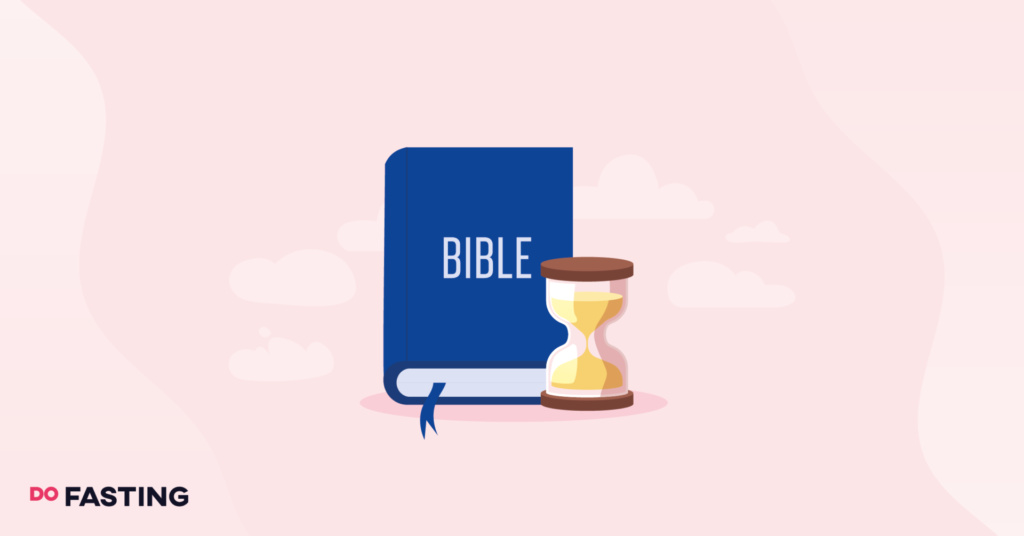Contents
The biblical definition of fasting
Biblical fasting is, at its core, the choice to abstain from food for spiritual reasons. It is mentioned in the Bible several times. A notable example that insinuates fasting being a regular occurrence is Matthew 6:16, where Jesus addresses His disciples, and He begins with, “When you fast,” as opposed to “If you fast.”
In Matthew 9:15, Jesus also says “they will” [fast] about His followers – instead of “might”. The difference between biblical fasting and going without food as part of a diet is the spiritual aspect of it. If you abstain from eating due to not having access to food, or trying to lose weight, it’s not related to as biblical fasting – even if you are a religious person.
Religious people opt to follow the word of the Bible and fast accordingly to fulfill their spiritual needs. In short, biblical fasting is abstaining from food – and sometimes other things – for solely religious reasons.
Take a
1-minute quiz
and discover how much weight you can lose with DoFasting!

Motivations for fasting
As mentioned, wanting to lose weight is not a motivation for starting a biblical fast. There are many reasons for believers to opt to try fasting. Some are right, but some, according to the Scripture, are not. The choice to fast should not be led by:
- Wanting admiration or being noticed: (Matthew 6:18) “The critical issue is not whether people know you are fasting but whether you want them to know so that you can bask in their admiration.”
- Seeking commendation to God (1 Corinthians 8:8) “Food will not commend us to God; we are neither the worse if we do not eat, nor the better if we do eat. Fasting does not cause us to “earn” something from God, but it helps us to be more receptive to what He wants to do in and through us.”
What are the biblical reasons for fasting?
Believers tend to fast because they believe in the promise of what comes after the life they are living. They abstain from what they can see and taste right now for the purpose of, in their belief, being rewarded in the afterlife.
Some cite fasting as being a beautiful, religious experience, and actually grow to enjoy it. The Bible talks about the process of abstaining from food several times. Here are some of the biblical reasons for fasting.
- Jesus fasted because He wanted to acknowledge His own dependence. He also wanted to gain spiritual strength through His public ministry. (Luke 4:1,2)
- According to the Bible, Jesus spent 40 days and nights fasting and praying in the wilderness. This was to help Him prepare for starting God’s work on Earth. (Matthew 4:1-17; Mark 1:12-13; Luke 4:1-14)
- The Early Church fasted during worshipping, as well as committing their ministry to the Lord. Fasting was also used for confirmation, guidance, and the appointment of elders. (Acts 13:2; 14:23)
- Sometimes fasting was treated as a means to a victory. After the Israelites lost 40,000 men in battle within the span of two days, they begged God for help. Judges 20:26 says that all the people went to Bethel and “sat weeping before the Lord“; “fasted that day until evening“. As a reward for their sacrifice, God helped them to victory over the Benjamites.
- Most of all, fasting is treated as a way to worship God. Luke 2 speaks about an 84-year old prophetess, Anna. The 37th verse says, “She never left the temple but worshipped night and day, fasting and praying.” Anna used fasting as an expression of her love for God.
The Scripture mentions fasting many other times, further highlighting that it used to be a common practice for religious people.
These days, many have stepped away from it, but fasting is still observed in some cultures prior to religious holidays. As a summary of the reasons why some believers choose to try fasting:
- Spiritual strength – as people claim to feel closer to God, they also report feeling protected from their enemies.
- Spiritual hunger – as we live in a society filled with consumerism, people find that fasting and depriving themselves brings them a new, religious kind of hunger.
- Wanting to test their own strength and the ability to turn down their own desires.
- Demonstrating their love for God.
- Sharing with the poor: (Isaiah 58:6,7) “To house the homeless poor, to loosen bonds of wickedness, to let the oppressed go free.“
- Wanting to forfeit the good worldly things for the best spiritual things.
Ultimately, it is down to each individual to decide why they want to fast. However, as long as it is done for spiritual, unselfish reasons, it is considered to be right by the Bible.
Biblical fasting rules
As fasting for religious reasons is not a science, it doesn’t come with a set list of rules. We have covered the right and wrong motivations for fasting – from then on, it’s up to you to decide your own rules. In general, fasting should be challenging.
It’s not meant to be an easy process and it is by no means lenient. Religious people consider breaking fast as succumbing to their urges, and as such, they try to stick to it as much as possible.
Of course, it is to be expected that most people will struggle if faced with too strong, too long a fast right away. That is why there are several different types of biblical fasting, and one can transition between them according to their current needs.
Types of biblical fasting
Religious fasts revolve around three main methods. If you’re interested in a biblical fasting diet, here is a summary of them.
Partial
This fast was described in the book of Daniel and is sometimes referred to as Daniel’s Fast. Daniel abstained only from “delicacies, meat, and wine” for three weeks. (Daniel 10:3) Essentially, this fast means that you would be abstaining from eating things you enjoy the most. As such, it is similar to many other forms of dieting.
You won’t necessarily have to go without eating for longer periods of time, as people that follow this fast do eat regular meals.
However, you won’t be drinking any alcohol, eating meat or snacks: candy, cookies, chips, fast foods, and other types of modern food. This is a good way to introduce yourself to the world of biblical fasting. It is quite restrictive, but not as restrictive as the other two known types.
Complete
This fast is a middle ground between partial and supernatural fasts. During a complete fast, you will be drinking water and juice for an extended period of time. While it does provide a moderate amount of energy thanks to the juices, it’s still not recommended for everyone.
Supernatural
Supernatural fasts are total fasts. You won’t be allowed to consume any type of food, be it solid, liquid, or even water. It is based on Paul, who went on an absolute fast for three days straight after his encounter with Jesus (Acts 9:9). Moses and Elijah followed an absolute fast for a total of forty days (Deuteronomy 9:9; 1 Kings 19:8).
Supernatural fast is admittedly not for everyone. Abstaining from both food and water can be dangerous. Unless you’re a healthy person with no known issues, you shouldn’t try to engage in this particular fast without first consulting a doctor.
This fast is most similar to intermittent fasting, where people sometimes go for 48-hours without water and food. However, they do break fast after that.
Bottom Line
Biblical fasting is a choice that not many people go through this age. Deeply grounded in religion and spirituality, it requires immense dedication.
However, those that are religious praise the benefits of it. If this is something that interests you, we recommend giving it a try and easing in slowly. Don’t jump in headfirst – your body will need time to adjust.
In the end, you will be able to decide whether biblical fasting is for you simply by trying and counting the benefits.
Take a
1-minute quiz
and discover how much weight you can lose with DoFasting!

Leave a Reply
See how DoFasting will improve your life
Find out what works for you with this 60-sec quiz approved by our experts and get your personal revolutionary fasting assistant.
Start the Quiz















4 Comments
I agree. I enjoyed reading. Please continue to post.
Thank you, we will! Trust us.
Hello, ϳust wanted to mention, I enjoyed this post.
It was insρiring. Keep on posting!
Oh, we will! Thank you.